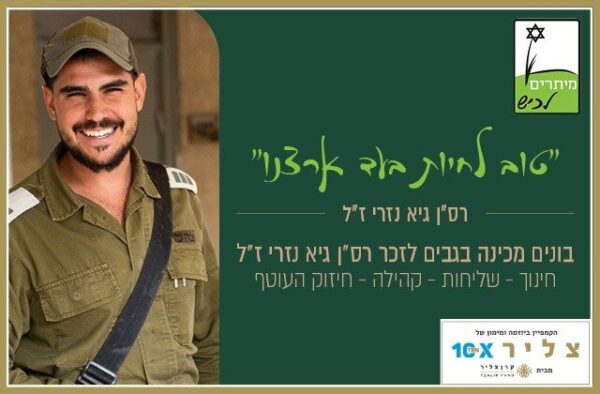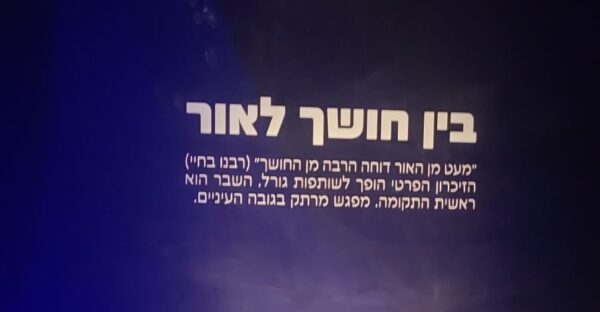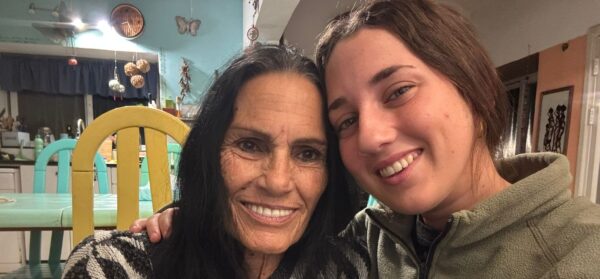Our volunteers live within the communities they serve. Having left their own homes, families and lives, their stories are inspiring and thought-provoking. From arriving in an unfamiliar place to understanding their new lives with all the trauma the communities have experienced, we offer some personal insights into what it is like to be an Elul Shnat Sherut 50 Plus volunteer.
Coming to a New Place
Reflecting on the First Weeks in the Field
The beginning of September is often marked by powerful and emotional moments of new beginnings, and we (the members of the Elul Shnat Sherut 50 Plus “Merhavim” group) were fortunate to experience a moving and extraordinary walking tour, just two days after our emotional “landing” in the south. The tour took place in the old “Mishor HaGefen” neighborhood of Ofakim, which was the hardest hit on October 7th.
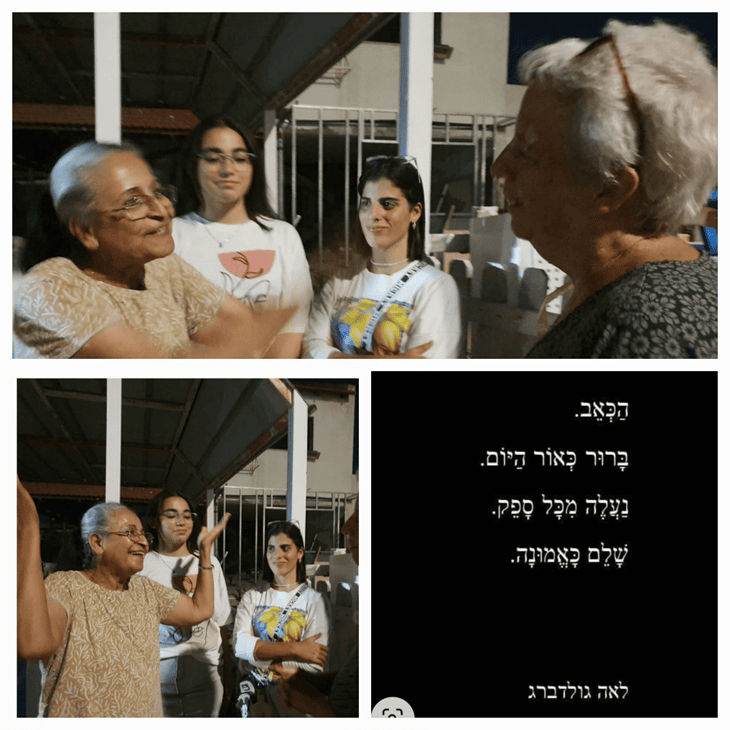
Nadav Mashaly, the director of the Ofakim Cinematheque and our tour guide, led us through the paths, among the greenery and blooming surroundings of the neighborhood’s low houses, while on the other hand, there were posters of heroism and mourning for its 52 victims. Six “story stations” were chosen by local teens who accompanied us. Each one of them conducted research around a personal story, which they presented in depth with authenticity, sensitivity, and quite a few tears. These inspiring, beautiful young people are part of the social cinema project “DocuCommunity.”
The people shared, in their own words, what they went through during those hours of panic and terror—such as a couple who lost both their sons, who had left their home to defend it, and a sister of one of the brave policemen who, after finishing their night shift, turned to the streets and tried to protect the threatened residents. There were neighbors who were brutally murdered in cold blood in stairwells and endless stories of heroism where locals faced dozens of terrorists (armed with assault rifles while they only had handguns).
There was great attention alongside questions that have no answers, deep sorrow, frustration, and bewilderment over the unimaginable abandonment they felt. This open dialogue with so many people with broken hearts will remain etched in all of us for many years. The gratitude was constantly present on their part, for us coming to listen and show interest in what they went through that Saturday, while they felt that the media and public attention were less focused on the heroic battle in Ofakim.
At the last stop, we were warmly welcomed by Michal Bilia, on the balcony of her ruined house. Michal is the mother of Ariel Bilia, of blessed memory, who saved his family from a terrorist raid by helping them escape through a window before the house was completely destroyed. She pointed to that same window on the second floor, from which Ariel was the last to not make it out, as he was brutally shot by terrorists who had entered the ground floor.
We met Michal, a strong, articulate, and inspiring woman, who insists not to call that Saturday the “Black Saturday,” despite losing the most precious thing to her—her son. According to her belief, Shabbat remains forever holy and pure, and we must continue to live and revive it as such, alongside the tragedy that occurred (and not darken it).
The house is in advanced stages of renovation, and she intends to move back in and continue hosting her children and grandchildren for the upcoming holidays.
Then, something no less than miraculous happened. Hedva (one of our volunteers) approached her warmly and with great sensitivity, and while hugging her, told her that in just a few days, she and her husband Davidi would be moving next door, into Ariel’s house (which had remained abandoned since then). Michal’s face simply lit up, her eyes sparkled with tears of sadness mixed with joy, and the first thing she said was, “You have no idea how much this excites and makes me happy. You’ve just made me truly joyful. I’ve been waiting for the day this house would come alive again. I can promise you that the good energies that Ariel left there are still embedded in the walls, and you will feel them strongly. Your good deeds, as they are, will be accompanied by even more strength and good intentions (which were such an integral part of Ariel’s too-short life). And we will be amazing neighbors!”
Simchat Torah 2024
The stories below are from the Substack Blog by Karin Garvish
We arrived home an hour after midnight.
On the night after Simchat Torah 5785, there was a second round of dancing at the Nova site, in the Re’im parking area. We drove over, parked, and “marked” our spot so we’d remember where we parked.
We made our way toward the center of the celebration, where Jewish music played and people danced in circles, rejoicing in the Torah. We were near the very place where, exactly a year ago, a music festival had been held on Simchat Torah 5784. Looking back and around, we were struck by the sight of silent memorials for those murdered just a year before. Photos of faces staring directly into our eyes, songs, belongings, and words about the victims. A large board displayed all their faces. We stood motionless, silently taking in the awe and gravity of what we were seeing.
After a while, we rejoined the celebration, danced a bit, then found ourselves drawn back to walk among the faces gazing at us from every direction.
For over two hours, we drifted between deep sorrow and true Jewish-Israeli joy. Throughout the evening, hundreds upon hundreds of men, women, and children arrived from all over the country, gathering in the main plaza. They joined the dancing circles, singing and celebrating. Like us, they wandered among the quiet memorials before returning to the celebration. It was a movement of going back and forth—between grief and joy, memory and presence.
After about two hours, we finally managed to pull ourselves away from the ground that felt heavy beneath our feet. We left in silence.
We walked back to where we thought we had parked, only to realize that the “marked” parking spot had seemingly vanished. For nearly an hour, we wandered through the vast area, experiencing a sense of being lost. But I didn’t mind—it felt fitting for the time, place, and experience.

We walked, sank into the sand, climbed up, and repeated the cycle until, with the help of a wise man who helped us locate our “mark,” we finally found the car.
We left in silence, joining a long convoy heading north.
We arrived home an hour after midnight.
This is one of the experiences I’ve had here since arriving as a volunteer in the adult service year group in the Eshkol Regional Council.
I am a social worker by profession, volunteering as part of the team in the social services department. Right now, I’m working with families connected to welfare, helping them navigate professional support in various areas, such as understanding their rights, having therapeutic conversations, going through rehabilitation processes, and connecting with other community services to support them.
Beyond the regular work hours, I’ve formed warm, special connections with residents across different communities. I try to share in the immense pain they’ve gone through here. I listen, I hear, and I participate in various community activities.
The confusion is profound and accompanies me with every step—both in my professional role and in simply living here.
I came to be with them.
On the one hand, to bring my professional skills, but above all, to be part of the difficult and unique journey experienced by every individual, by the communities, and by this entire beautiful area.
I am in awe of their resilience.
I hold long silences within myself.
And I continue.
Reflection of the First Week
A week has passed since I last wrote in this journal of reflections, whose nature and fate I have yet to decide. Here I am, sitting by the kitchen island in our new home in the settlement of Avshalom in Pituach Shalom, part of the Eshkol Regional Council, near the Gaza border. Tovi is lying at my feet on a royal cushion we brought for her from home, and I am looking out through the wide glass doors in the living room at the garden (lined with synthetic grass and surrounded by a wooden fence). From this particular angle, everything appears familiar and natural – just another well-kept community settlement, with no signs of the war raging just a few kilometers away. The echoes of war are often heard: distant thunder of artillery fire, almost impossible to imagine the destruction and devastation it must be inflicting on its targets. And to think that less than a year ago, the residents here were barricading themselves in safe rooms while a murderous pogrom raged around them.

Last night we took a walk through the neighborhood, and both of us reacted tensely to the roar of a motorcycle engine that passed nearby. Everything is charged and marked by memories of the recent disaster. There are no innocent sounds, and there are no sights or events that manage to remain free from tragic and traumatic associations.
In this surreal setting, I am taking comfort in the scent of cleaning products that I have liberally used to domesticate the space, and the refreshing breeze from the powerful air conditioner in the living room. Yesterday at noon, we set out in a convoy of two cars heading south, hoping to take the first steps toward settling in the border area for the sake of our volunteer year. We packed a few bags, some boxes, an enthusiastic dog blissfully unaware of the adventure we were dragging her into, and a lot of hope for sane days ahead. We hit the road, struggling to believe ourselves for this move we somehow got swept into. Several times throughout the day, one of us – or both of us – paused to ask what on earth was happening, and how we were disconnecting from our familiar routine and beloved, comfortable surroundings, uprooting ourselves to the ends of the earth.
A strange, thrilling, terrifying feeling, one that we might only be able to unravel at the end of the journey, a year from now.
The Cinematheque in Ofakim
This is the only movie theater in Ofakim, a cinema with perhaps 60 seats. Every film that comes to Ofakim is shown there. It is run by Nadav Mishali, a native of Ofakim who lives in the city and is a filmmaker himself. He has made this project his life’s work. I understand that he has been fighting to keep this place running for eight years now. Films are shown there almost every day, except Friday evenings. It’s not necessarily what comes to mind when you hear the word “cinematheque.”
Unfortunately, it doesn’t seem like many residents of Ofakim come to the screenings. When there are special films, people from the surrounding area attend, but the most significant audience for the cinema is us—the Merhavim group of Shnat Sherut for Adults. Many times, we make up the majority of the audience.
Yesterday, for example, a film was shown to 11 people—all from our group. The next day, we went to see another movie. This time there were four of us from the group and about 15 others.
I’m not sure if this constitutes integration into the community… but perhaps, simply by supporting the existence of this place and enjoying it ourselves, the answer is yes.
First Week in Sha’ar Ha Negev
On Friday morning we decided to go on a hike in the area. We drove south to Be’eri to check out the big famous bike store. The store was closed, but we did see some people there. We met a father and daughter from Be’eri – and after chatting with them about good hikes in the area, and the fact that the bike store was closed (what ?– you think kibbutzniks will work on a Friday??) we discovered that they not only know our friends from Be’,eri , who are currently in Boston, but they are good friends and had just received pictures from them. Small world. They also were very interested in how we decided to leave Boston with the snow and come to Sha’ar Hanegev.

We went on a beautiful hike with fields of wild anemones – the whole south of Israel in this season is called “Darom Adom” or ”red south” since there are red anemones flowering all over. We went on a hike but did not see any other hikers or people on foot – we did see cyclists, motorcyclists, jeeps, ATV’s and horses and many picnicking couples and families.
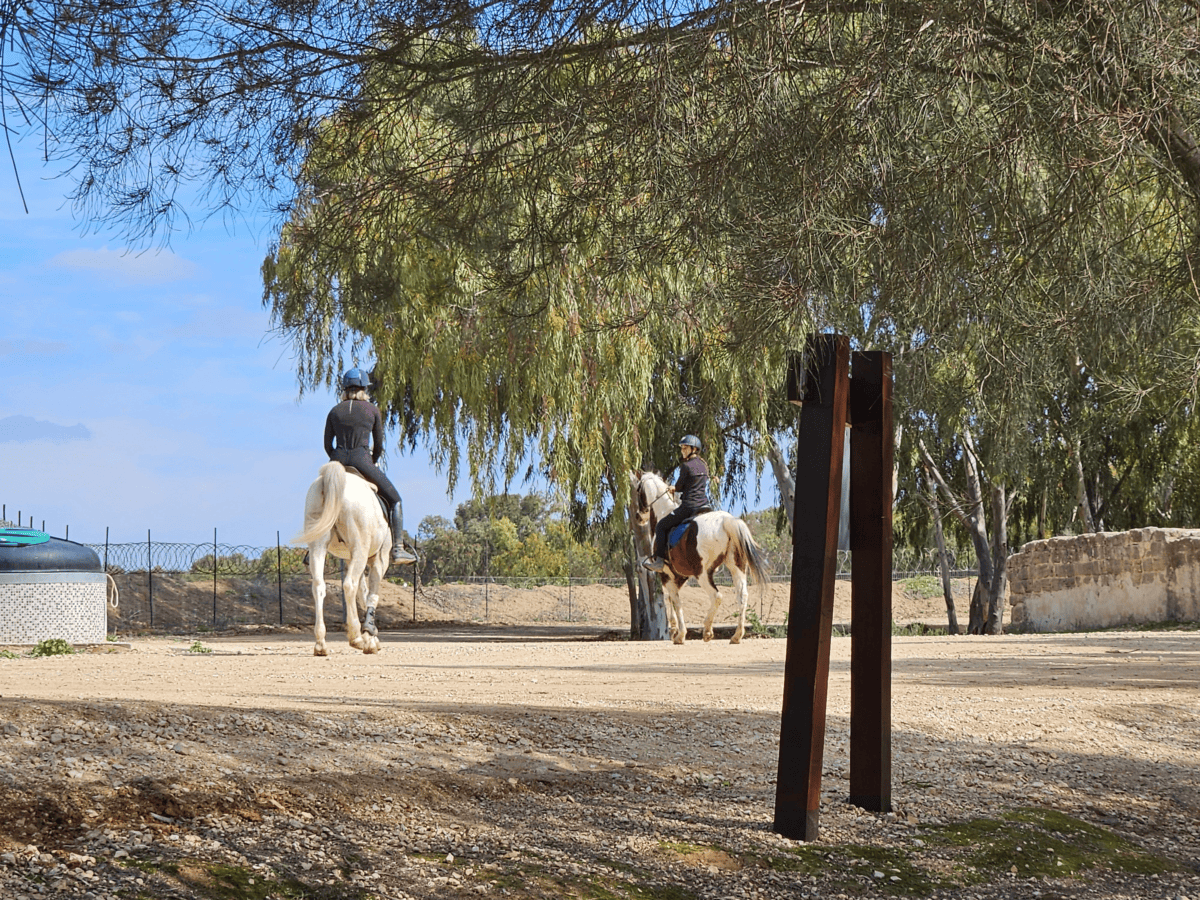
We spent the weekend in Tel Aviv and Jerusalem with our children, and my parents, which is such a bonus that we are so close, on the same continent.
On Sunday we spent the morning on errands in Tel Aviv and then drove south to Kfar Aza for our first full week on our new “job”. We had another packed car with additional things we collected for our house – to make it homier. Sunday afternoon is our time to be together as a group of volunteers. We did some interesting things and learned more about each other. Noni and I suggested a game – since we were curious about the ages of the other participants, we assumed they too were curious about that. We suggested that we try to organize ourselves in our age order. Each person should get up, in a random order of how wee were seated, and place themselves on the “age” line as older or younger than the person or people already on the line… after everyone had a spot – we had the oldest person start and check if the next person was in the right spot… we continues until everyone was in the right order, we did have a buch of people that guessed themselves younger or older…… and our age range is 56-72. Noni and I are in the middle – younger half.
On Monday we started our first week of volunteering in the schools. I am in the elementary school Alonim, supporting the students in English. Noni is in the high school, supporting the students in math. My days were quite full as I met the students in 4th to 6th grade. My work began with small groups of the stronger students, and then small groups with all students and we worked on getting to know each other. In my role as supporting English, I only speak in English to the students, to a point that they are not even sure if I speak Hebrew. In our first meeting they told me about themselves, what they wanted to share – like where they live, what they like to do (a lot of video games, scrolling and annoying their siblings…) . I also told them where I live – in Kfar Aza. Some of the children responded that I must now be in Ruhama – which is where all the displaced families from Kfar Aza have been relocated to. I confirmed that I am in Kfar Aza. Some children said that they thought it was impossible to live there as all the houses had been burned down. I assured them that most of the houses were not burned and that there were other people living there too. Some asked if I was scared to live there. I said that now there is a cease fire so I am not scared. I did not share that I am not sure how I will feel if and when the cease fire ends.

